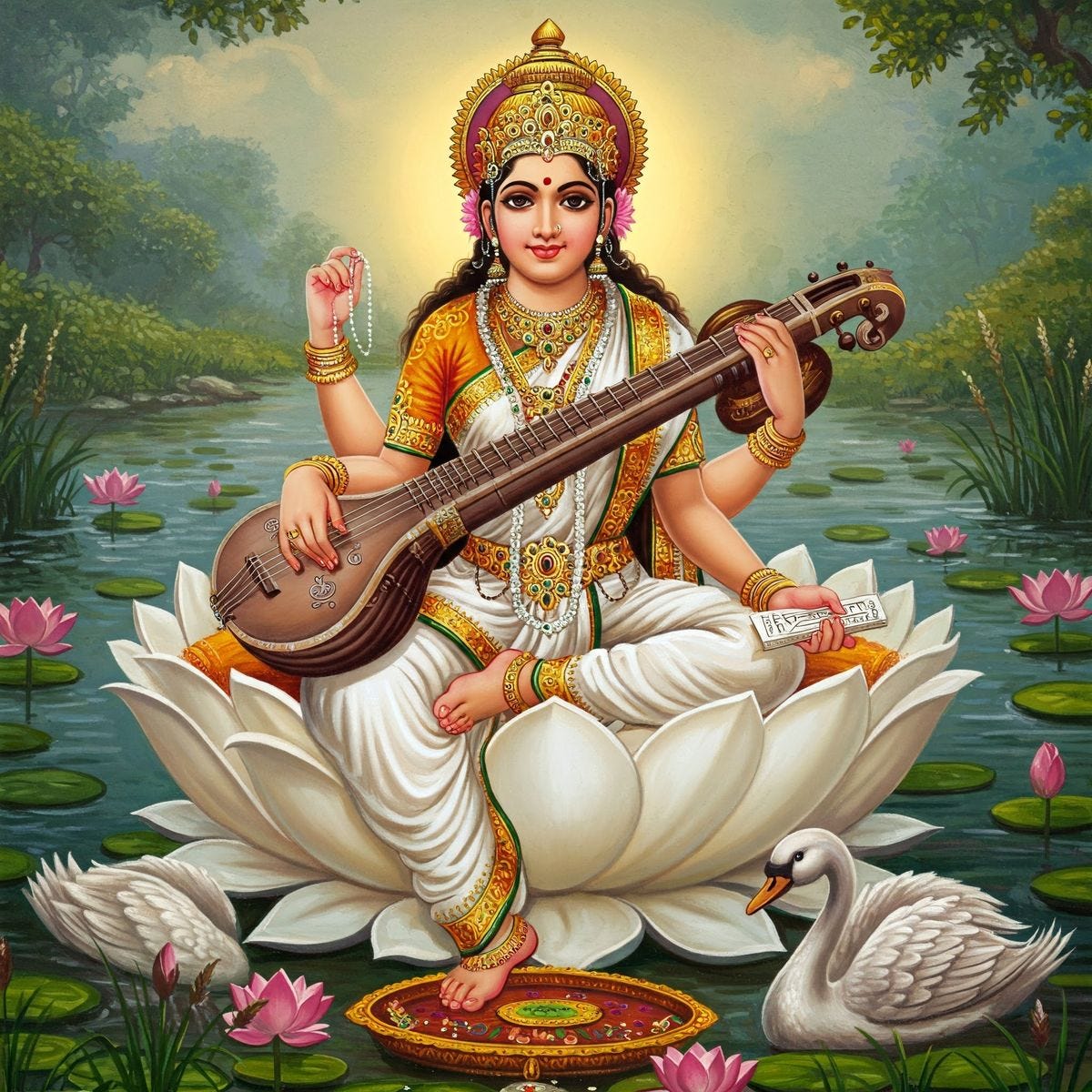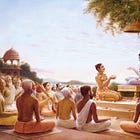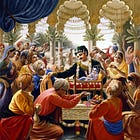How Sarasvatī and Brahma are different from ordinary couples
Sarasvatī is described as the consort of Brahma, but there are no descriptions of their family life. He has many children, but he produces all of them out of his own mind, without her participation.
One question I always had was about the relationship between Lord Brahma and Sarasvatī Devi, the Goddess of learning. Sarasvatī is described as the consort of Brahma, but there are no descriptions of their family life. Brahma has many children, but he produces all of them out of his own mind, without the participation of his wife. In other words, Brahma doesn't need her to perform the creation and create descendants.
Brahma and Sarasvatī don't have any kind of sexual relationship. They are described as consorts, but their relationship is very subtle. In the Krsna book, Srila Prabhupada describes it like this: "Lord Brahmā, who has full control over the goddess of learning and who is considered to be the best authority in Vedic knowledge, was thus perplexed, being unable to understand the extraordinary power manifested by the Supreme Personality of Godhead."
By this sentence, we can understand how subtle their relationship is. Lord Brahma and Sarasvatī are not consorts on a physical level, as an ordinary couple. Sarasvatī Devi is like the energy of Lord Brahma, connected with the understanding of Vedic Knowledge. She is like the intelligence of Lord Brahma, we can say.
In the Brahma-vaivarta-purāṇa, it is described that Sarasvatī is one of the eternal potencies of Krsna, which manifests inside the material world from the mouth of Brahma, just like Lord Siva appeared from his forehead. Even though they are eternal, both Siva and Sarasvatī appear to be created from Brahma as if ordinary material creations. However, this is just a play. After appearing, Sarasvatī is given to Brahma by the Lord Himself to be his lifelong companion.
This explains passages such as Devī-bhāgavata-purāṇa (one of the upapurāṇas), which depicts Laksmi, Gaurī, and Sarasvatī as being creations of Mahadevi (the material energy) and given to Viṣnu, Śiva, and Brahma as their consorts. In reality, all three of them are eternal potencies of the Lord, but superficially they appear in the material world, and thus appear to be manifestations of the material energy. This is is however, just apparent, just as a person appears to be born, while in reality the soul is eternal. The Devī-bhāgavata-purāṇa describes it like this just to increase the faith of Mahadevi's worshipers.
Although Brahma receives Sarasvatī Devi as his wife, he does not try to enjoy her in any way. Instead, she helps him to understand Krsna, just like she helps other souls in the material universes to understand Vedic knowledge. In this sense, Sarasvatī is related to the gāyatrī mantra in some passages.
Some commentators equate Sarasvatī with Vac, the daughter of Brahma, to whom he became attracted, and from this come stories of Brahma chasing Sarasvatī to have intercourse with her, but this seems to be simply a case of misinterpretation, which leads them to mix the two stories. The word "vac" denotes both the daughter of Brahma and speech, but Sarasvatī is described as vac in the ordinary sense of the world, meaning she empowers her worshipers to speak well, not in the meaning that she is the daughter of Brahma. We can see that the Srimad Bhagavatam describes both Vac and Sarasvatī as separate persons.
We have information that in the spiritual world, there are also couples, but their relationships are centered on their service to Krsna. In the spiritual world, couples cooperate in their service to Krsna. Although anatomically complete, they consider sexual relationships distasteful and don't engage in it. This is described by Prabhupada in his purport to SB 4.23.29:
"In the Vaikuṇṭha planets there are husbands and wives, but there is no question of their giving birth to children or having sex life. In the Vaikuṇṭha planets both husbands and wives are extraordinarily beautiful, and they are attracted to one another, but they do not enjoy sex life. Indeed, they consider sex not to be very relishable because both husband and wife are always absorbed in Kṛṣṇa consciousness and in glorifying and chanting the glories of the Lord.
According to Bhaktivinoda Ṭhākura also, a husband and wife can turn the home into a place as good as Vaikuṇṭha, even while in this material world. Being absorbed in Kṛṣṇa consciousness, even in this world husband and wife can live in Vaikuṇṭha simply by installing the Deity of the Lord within the home and serving the Deity according to the directions of the śāstras. In this way, they will never feel the sex urge. That is the test of advancement in devotional service. One who is advanced in devotional service is never attracted by sex life, and as soon as one becomes detached from sex life and proportionately attached to the service of the Lord, he actually experiences living in the Vaikuṇṭha planets. In the ultimate issue, there is actually no material world, but when one forgets the service of the Lord and engages himself in the service of his senses, he is said to be living in the material world."
This cooperation between Brahma and Sarasvatī Devi is a good example of how, even in this material universe, relationships can be purified. Of course, this is not advisable for young couples, who need to navigate through their material desires and build their families, but this is an ideal that can certainly serve as a model for older couples, who have completed their family obligations and are now preparing to enter renounced life.
Read also:
If you read this article to the end, give it a like. This helps it to reach more people.
If you have questions, use the comments; I will answer as possible. They may even become the topic for another article. Your thoughts and opinions are also very welcome. ⤵️





